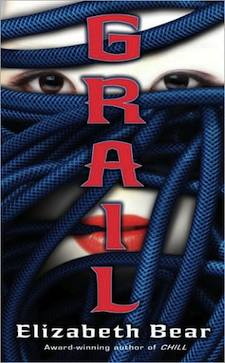Grail by Elizabeth Bear is the concluding volume of the Jacob’s Ladder trilogy, after 2008’s Dust and 2010’s Chill.
It is perhaps a little awkward to review a book which mentions your name in its acknowledgements. So by way of disclaimer, I’d like to acknowledge that right here at the beginning. You can make your own judgements, I’m sure, on whether that constitutes a conflict of interest with regard to this review. And now that I’ve got that out of the way….
The generation ship Jacob’s Ladder has survived internecine strife, tragedy, and conflict that almost destroyed the vessel. Now, fifty years on, with Perceval Conn secure in her position as Captain and the ship very nearly whole, they are approaching landfall.
Unfortunately, the planet of Fortune is already inhabited. Due to the length of their journey, the Jacob’s Ladder has been leapfrogged in transit. The human inhabitents of Fortune are not entirely sanguine about the prospect of sharing space with the generation ship’s crew. For during the centuries the Jacob’s Ladder spent between the stars, the human race developed a means of reducing their conflicts—“right-minding,” which eliminates dangerous “sophipathologies” such as fanaticism and religion. The unrightminded crew of the Jacob’s Ladder, a ship with an New Evolutionist Bible in the corridor outside its bridge, present a disturbing prospect.
Neither is all the crew of the Jacob’s Ladder entirely happy about making landfall. And with the reemergence of two very old nemeses, Ariane Conn and the angel Jacob Dust, the situation aboard the ship spirals rapidly into open conflict.
Bear does a lot of things right with this book. “Sense of wonder” might be a cliché in science fiction, but the Jacob’s Ladder has the weird and wonderful—and amazing—by the bucketload, from talking carnivorous plants to the necromancer’s library of trees, and from winged engineers to the ship’s angel Nova. The society of the planet Fortune, as seen through the eyes of its administrator, Danilaw Bakare, is briefly but believably drawn, and the clash of cultures which takes place when Danilaw meets the Jacobeans (I find myself wanting to type Jacobites, which is not exactly the same thing) rings both fascinating and true. This is the first time in three books that the Jacob’s Ladder has been shown from an outside point of view, and Danilaw has a very refreshing perspective.
The characters about broke my heart several times over. This is not, I think, a book which is very amenable to standing alone. The complicated and painful history of the Conn family is what provides the book’s thematic arc with its emotional weight—which is not to say that someone who has no previous emotional investment in the fate of the Jacob’s Ladder, of Perceval, Tristan, Cynric, and Benedick Conn, Dorcas the Go-Back who wears the body of Tristan’s long-dead daughter Sparrow, Mallory the necromancer, et alia, will not find the reading experience enjoyable, but I doubt they will find it quite as rewarding or satisfactory.
(When one particular character bit the bullet, I will confess I cried. In the usual run of events, books do not make me cry.)
True to form, the conclusion is tense, even nail-bitingly so. The final chapter (entitled “the feeble starlight itself”: the chapter titles in all three books are not infrequently a joy to consider), in my opinion, doesn’t quite leave enough space to assimilate the implications of the climax of events. Although the dangling emotional threads are, I suspect, left as tidy as one could in all conscience expect.
Grail is a damn good book, and one I truly enjoyed reading.
Liz Bourke is reading for a research degree in Classics at Trinity College, Dublin. A longtime SFF fan, she also reviews for Ideomancer.com.










